Suchergebnisse für "Factsheet%3A Energietechnologien gestalten%2C die f%C3%BCr alle sinnvoll und nutzbar sind"
CityCalc - Calculation Tool for Energy-Efficiency in Urban Planning
To assess the energy performance of urban planning projects in early design stages with low input and evaluation effort within the project CityCalc, an easily applicable planning and evaluation tool has been developed.
Circular Economy Compass (KLW-Komp)
The Circular Economy Compass project has developed a responsive online self-assessment tool for the circular economy in SMEs. Based on a theory-based evaluation scheme, it is be possible to determine a company's degree of preparedness for a circular economy at a reasonable cost. To this end, the tool has a computational logic that automatically generates a circularity score (KPI, Key Performance Indicator) based on the answers.
AR-HES-B – Energy storage, production and recovery of valuable substances in wastewater treatment plants
AR-HES-B develops technologically based concepts of municipal wastewater treatment plants in order to convert them from energy consumers into a hybrid energy provider, energy storage and a provider of resources. The concept enables wastewater plants to turn into an important platform in the regional energy and mass transfer.
Connection of innovative strategies and technologies to a holistic, resources-friendly plus energy building (FUTUREbase)
On the basis of a construction project in Giefinggasse 4 in Vienna the combination of new, innovative strategies and technologies to an integrated, resources conserving plus energy building with high signaling and multiplication effect had been tested for feasibility. A regional, energetical bond between the buildings TECHbase, ENERGYbase and the Klima-Windkanal had been developed.
The Sahel Project
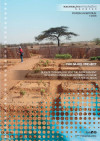
Silicate technology for the improvement of water uptake and nutrient storage in marginal soils
Forschungsforum
1/2006
Herausgeber: BMVIT
Englisch, 6 Seiten
Downloads zur Publikation
Carless Tourism In Austria

The valleybus project Lungau, Murau, Nockgebiet - an innovative pilot scheme
Forschungsforum
3/1995
Herausgeber: BMVIT
Englisch, 6 Seiten
Transparent Thermal Insulation
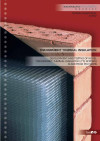
Development and Testing of novel Transparent Thermal Insulatio (TTI) Systems made from Polymers
Forschungsforum
2/2002
Herausgeber: BMVIT
Englisch, 6 Seiten
Downloads zur Publikation
Elaborated Assessment of Competing Smart Grid Solutions (SG-ESSENCES)
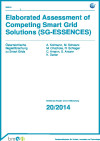
Österreichische Begleitforschung zu Smart Grids
Schriftenreihe
20/2014
A. Kollmann, M. Schwarz, et al.
Herausgeber: BMVIT
Deutsch, 124 Seiten
Downloads zur Publikation
Smart Grids - Rechtliche Aspekte von Intelligenten Stromnetzen in Österreich
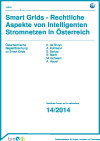
Österreichische Begleitforschung zu Smart Grids
Schriftenreihe
14/2014
K. de Bruyn, A. Kollmann, et al.
Herausgeber: BMVIT
Deutsch, 247 Seiten
Downloads zur Publikation
Handlungsfelder zur Weiterentwicklung des Institutionellen Rahmens für Smart Grids in Österreich
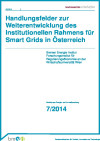
Schriftenreihe
7/2014
Bremer Energie Institut Forschungsinstitut für Regulierungsökonomie an der Wirtschaftsuniversität Wien
Herausgeber: BMVIT
Deutsch, 48 Seiten
Downloads zur Publikation
Homeservices by the company of tomorrow
Sustainable services in co-operation with the housing sector will be investigated, their effects on environment, employment, acceptance by consumers, hindrances as well as prerequisites for sustainable facility management and a new positioning of concierge systems analysed.
INFINITE: INnovative FINancing models for sustaInable urban energy sysTEms
The goal of the INFINITE-project is to lay the foundations for a more wide-spread implementation of urban energy supply systems across buildings, using renewable energy sources produced in local supply units. At the same time the projects supports to reduce the demand for fossil fuels and higher-level energy infrastructure.
SUPERBE - Potential of Superblock-concepts as contribution to planning energy-efficient urban quarters
The exploratory study SUPERBE for the first time looks into the applicability and potential effects of Superblock concepts in an Austrian urban context in order to assess their contribution to energy-oriented urban planning.
Urban Mining - Energy and resource savings due to urban mining
The use of natural resources in long-lived products and buildings has led to the build-up of enormous urban material stocks. The present project analyses the potential of these urban mines to increase the resource efficiency of modern cities.
Sustainable construction of objects as a product service
Project of a Carinthian plant construction and manufacturing company. They plan to establish a new business division "sustainable construction of premises". This division shall offer a service package for housing, stores, and industrial production sites. This service shall be developed using the approach of RISP.
Integration of renewable energy sources for district heating in cities
Portfolio of technologies and action plan for the integration of renewable energy sources for district heating in cities and for enhancing the total efficiency of the supply chain from energy input to energy service.
Sustainability Management System - scorecard-based construction of an operative sustainability management
Implementation of a scorecard-based sustainability management system in four enterprises; adaptation of a web-based software for sustainability management and reporting; preparation of the manual "Sustainability Managing Systems" on the basis of the OIN guidelines "Reporting about Sustainability".
Participation in CEN TC 350 (sustainability of construction works) - WG4 Economic Performance Assessment of Buildings
Participation in the CEN TC 350/WG4 to develop a standard to evaluate the integrated effectiveness of buildings during their life cycle. Evaluation and integration of national comments in order to prepare the standard for the final vote.
Financing Models and Strategies for future Energy Infrastructures (FINAMO)
Contribution to decarbonisation 2050: The development of suitable financing models plays a key role when implementing new energy solutions. (Juli 2019)
S - House
Innovative Use of Renewable Resources demonstrated by means of an Office and Exhibition Building
